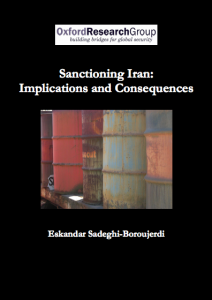Sanctions without compromise won’t end Iran nuclear impasse
via Lobe Log
 In a new report for the Oxford Research Group (first excerpted at PBS’s Tehran Bureau) author Eskandar Sadeghi-Boroujerdi explains why sanctions without compromise won’t change Iran’s hardline leaders’ stance on the nuclear program:
In a new report for the Oxford Research Group (first excerpted at PBS’s Tehran Bureau) author Eskandar Sadeghi-Boroujerdi explains why sanctions without compromise won’t change Iran’s hardline leaders’ stance on the nuclear program:
The key dilemma which Western policymakers should consider is that, rightly or wrongly, the Supreme Leader and much of the governing elite have staked their legitimacy on the nuclear programme. This is one reason why Oxford Research Group in consultation with former policymakers and diplomats with direct experience of the Iranian nuclear file emphasized that in order to reach a diplomatic solution, Iran should be offered a package with integrated “face-saving” measures. This briefing has also sought to make the case that sanctions and defiance are no replacement for serious diplomacy, which ultimately means that both sides must show their readiness to depart from their opening positions.
If Iran’s total submission and relinquishment of all right to uranium enrichment is the endgame, then sanctions are highly unlikely to succeed as long as the present governing elite remains in power. A compromise solution, however, remains feasible and not beyond the realm of possibility.
Another factor which should be considered is that Iran does not believe the U.S. is prepared to offer a deal that would be palatable to it prior to Obama’s re-election. Similarly, it is doubtful that Ayatollah Khamenei, and Ahmadinejad’s domestic critics, would favour conclusion of a comprehensive deal with the P5+1 if it meant Ahmadinejad could claim it as a victory and capitalise on it domestically. The Iranians thus want to keep negotiations going, so that diplomatic contact is maintained until the arrival of the most apposite time to strike a deal. Iran’s economic turbulence of course impacts its plans in this regard, but nonetheless the aforementioned should be borne in mind.
If the objective is to curb and limit Iranian uranium enrichment activities, and ensure they remain peaceful, then the sequencing of any deal needs to be carefully weighted to promote a “balance of advantage” for both sides of the dispute. As we had previously laid out in “Iran’s Nuclear Impasse: Breaking the Deadlock,” it may be possible to exchange the demands made on Iran’s nuclear ambitions with the progressive lifting of nuclear related sanctions. It is still possible for the West to use the leverage provided by sanctions constructively. As yet however, there are few signs that the U.S., France, Germany and Israel will agree to any such scheme.
En Español
The Latest
 From IPS News
From IPS News- Who Should be the Next UN Leader?PART 4
- ‘Living in Fear’: Landowners in Uganda’s Oil Field on Brink of Eviction
- Better Incentives Needed to Expand Solar Energy in Cuba
- Africa Pushing Limits To Boost Renewable Energy Supply Chain, Security
- Who Should be the Next UN Leader?PART 3
- Trade Deception Returns in Pan-Africanist Guise
- Solar Power and Biogas Empower Women Farmers in Brazil
- Migration in the Americas: A Dream That Can Turn Deadly
- Rural Entrepreneurs Thriving Against All Odds in Zimbabwe
- Conflict’s Long Shadow Has a Name: It’s Hunger
- Online fundraising for IPS Inter Press Service at Razoo













